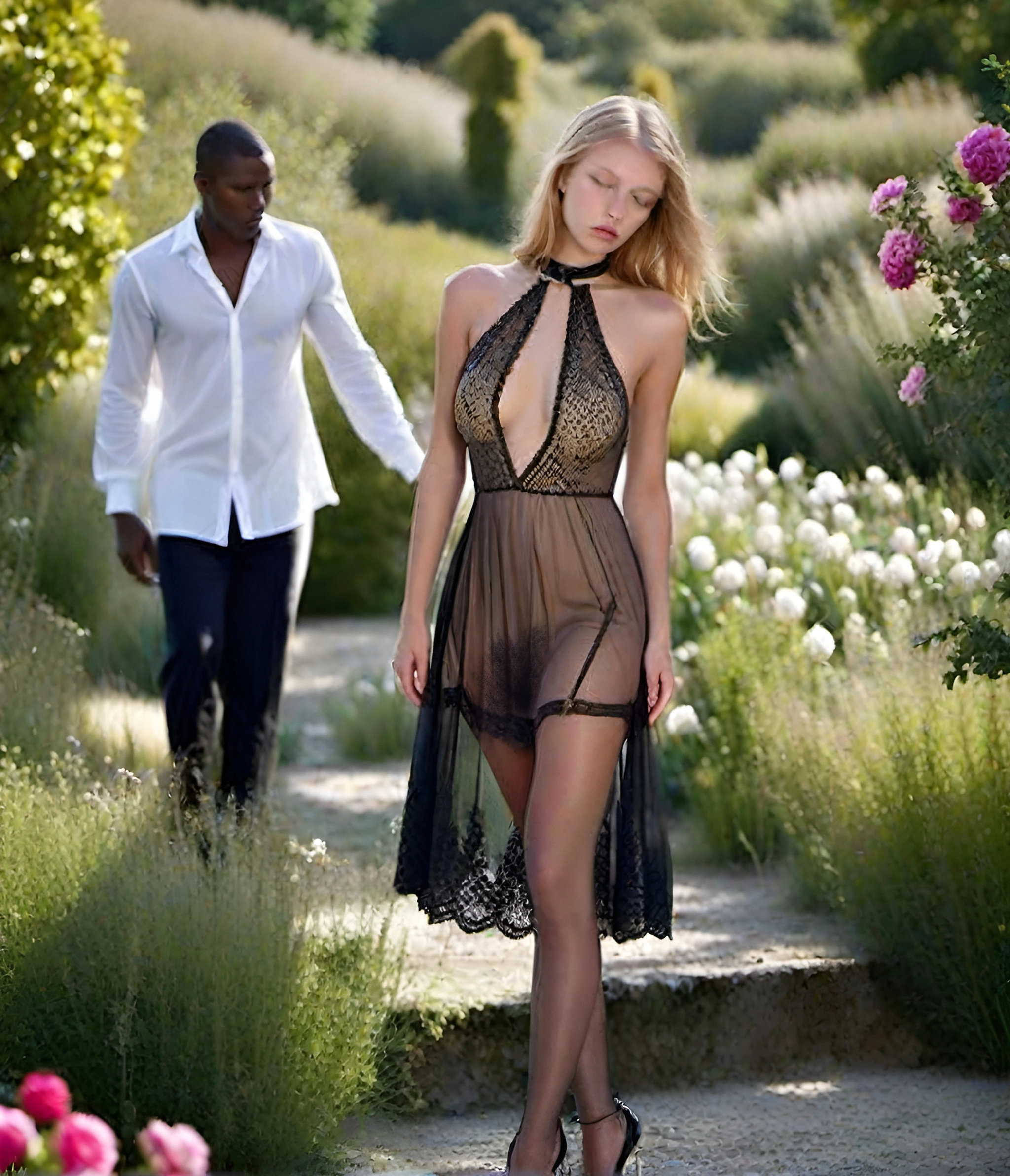Another picture from this year’s party. This is not really a sex story. It just didn’t go that way. Apologies.
Therapy
France, it has to be admitted, has a fairly racist culture, which has not really ‘moved with the times’. At the same time, there is a healthy respect for money.
The rapper, musician and now fashion-house owner Teechal-D is not, by any means, the first Black full member of The Castle (you’d have to go back to the Roaring Twenties to find him), but still, there have only been a handful, and those mostly of African nationality— kleptocrat ex-presidents and foreign ministers, that type.
Teechal-D is as French as they come, raised in les banlieux — the sprawling dystopian ghettos built by the French city for its poor and darker skinned citizens, both visually and physically as far from the popular idea of Paris as possible.
A superstar in the francophone world by the time he was twenty, he had done something rare for a French pop culture star, and gone international (committing the cardinal sin of rapping in English, but somehow getting away with it, mixing up the languages in his songs, leaving enough in-jokes and obscure puns in the French for his homegrown fans to understand that he is still theirs).
His wealth alone had made him elegible, but he earned his acceptance into the inner circles of The Castle by introducing several of his dancers to the stable, where they had proved both popular and enlivening.
Picture: Former rap video girls, now part of the stable

He is about to earn an invitation to the Great Table, now, by delivering his on-off girlfriend, Tamara Collingwood, into voluntary slavery. Tamara— @T-girl in the tabloids, and on all her social media accounts — is a model, and actress, a singer, but most of all, she is a crazy mixed-up wild-child, the oldest daughter of a new-money family— with an anarchic, foul-mouthed but brilliant comic for a father, and a formerly strung-out ‘it’ girl for a mother.
She doesn’t want to become a sex slave. But then again, she famously doesn’t want to do anything that is good for her— failed to turn up for her Glastonbury headline, deliberately got herself banned from the Condé Nast empire by wearing a keffiyeh to all the after-parties during Paris Fashion Week.
Picture: Tamara

Teechal had planned his international debut as a duet with Tamara, having never met her. His agent and hers had told him she was impossible to deal with, unreliable, flighty, obstinate and contrary. but she had agreed to meet him.
He had met a child. Far from finding her difficult, he had seen right through her. Compared to the unpredictable mixes of razor-sharp, fragile and needy, and stone-cold pragmatic that characterised the girls he had grown up with, this english girl was child’s play; but she was also crazy.
He’d ensured her early arrival at the recording session by telling her, after several weeks of detailed negotiations, that he had decided to work with a rival of hers instead. He had booked the rival, too.
When Tamara had confirmed with her agent that this was so, her arrival had been guaranteed. Blazing with fury, she had demanded to be allowed to record, and had delivered an incredibly intense performance, with an improvised free-form rap dissing her rival so viciously and inventively that an early edit of the song began to circulate, notorious long before it was issued, guaranteeing an instant hit on its official release.
The rival had been paid in full, and, even though Tamara and Teechal were known to be dating, she’d been given a chance at revenge through another duet, which also sold in the millions. Tamara’s tantrum about that was both very public, and very photogenic, and many more sales followed.
And so they became a staple of the gutter press and the gossip pages— Teech-Tee— are they on, or off, or actually playing games with everyone for the PR? In the end, it was always so weird and funny and so damn cold that no-one cared if it was an act or not, it sold.
As far as Tamara is concerned, they are indeed on/off in the most extreme of ways. From Teechal’s perspective, all is calm; he’s playing her. Not coldly, though; he wants her. He really wants her; has wanted her since he first saw her on YouTube, age 16, singing something she’d made up in her bedroom, her first steps toward stardom.
But he doesn’t want the wild-child. He doesn’t want the popstar, he doesn’t want the actress. He wants the girl. He wants to have babies with her. Its not love, really— it’s desire. He desires her, in totality. He needs to own her.
And it is The Castle which will deliver her to him, he has determined. It’s why he joined. He’d heard about it, rumours, mostly inaccurate (The Castle likes to have wild, exaggerated, easily disprovable, but very contagious untruths spread about it— it creates excellent cover). These had never interested him; he had no need at all for more willing sexual partners, and he wasn’t interested in hurting or humiliating young women.
What took his interest, as you may have guessed, was meeting Anne-Marie. For a start, she was utterly unmoved by his fame, his wealth or his artistry, which was refreshing.
When he had made it clear that he actually wanted to talk to her, she had grilled him, politely, but ruthlessly, for about ten minutes, latching onto the most revealing word of his every answer, and requiring him to expand upon it. He had experienced rage at the beginning of this, but controlled himself and quickly switched to respect. Here was someone as hard-edged and clear-eyed about the realities of existence as he was, and whip-smart to boot.
All at once, Anne-Marie had seemed satisfied, and, very simply, stopped; leaning back in her chair, looking at him, steadily, a faint smile on her lips, waiting.
She had not been disappointed.
“I have an idea…” he’d said, and they had talked, then, slowly and carefully, in no hurry, for almost an hour.
Tamara, of course, saw herself as a proud and assertive feminist. When Teechal had told her about The Castle she had reacted with disgust and anger, as was predictable.
When she’d calmed down a little, he’d pointed out to her that she often asked him to tie her up for sex. She’d replied that the important word in that sentence was ‘asked’, that it was her consent that mattered. He’d countered by asking why she’d never agreed a safe word with him; why she’d always said that there’d be no point being tied up if she could just ask to be released at any moment.
There had been a silence, then.
“All the girls there have signed a detailed consent contract; they know what they’re doing. They are treated very harshly, yes, but they know in advance that that will be so.”
In the end, as he’d known it would, her curiosity had got the better of her, and she’d said she wanted to see with her own eyes.
They’d gone to the public restaurant first (See Odile, 6-10), and Tamara had gone crazy about the maid in the foyer (Maids are here), and had spent fully half an hour talking to the girl, then insisted on having her sit with them at dinner.
She’d been silent in the limo after; unresponsive, saying she needed time to think, then strange for days, absent, keeping to herself, spending hours next to the piano, though not playing, just plinking single notes every now and then. It was how she wrote songs.
She wouldn’t talk to Teechal about any of it, though, and eventually had a massive blow up at him and once again stormed out.
The song she had finally recorded had been a scandal of epic proportions, banned in many countries and most radio stations, with its chorus of Fuck me, rape me, beat me, hurt me; treat me like the object I am contrasting with the wild anarchy of the verses, detailing the terrible things she had imposed on various lovers and one-night stands, the specifics of which several of the sufferers claimed were true.
She would walk out of any interview where she was asked a question about the song.
She’d crawled back to Teechal after a drugs bust in Thailand, which although minor, could have resulted in a public caning, and this time, he explained to her how he thought The Castle could be good for her.
“I want you, baby girl. You know how much I want you. You know I do. I do want to own you. But not like those guys; I’m not so insecure I need to beat you or chain you, or rape you.”
“But you, baby. You are so tied in knots, so angry, so frightened, so needy. You could go to therapy, perhaps— if you would— but that will try to heal you. I don’t want you healed— and neither do you; you need to be wild, free, crazy; for your music, for your creativity.”
“I talked with Anne-Marie; I want you to talk to her. She agrees; six months, a year at most, at The Castle, and you’ll be in control of yourself, without becoming boring. She knows— she went through it herself. Wait till you meet her; she’s so tough you’d think she’d grown up in the ghetto, run a crew.”
The next six months had been tumultuous, but between them, Teechal and Anne-Marie have managed the girl, and now, the day has come.
This Garden Party is T-girl’s last day of freedom, until the day Anne-Marie and Teechal agree she’s ready to earn her new place in the world; to rebuild herself. To become herself.
She can’t believe it. Everything inside her is on the move, tingling, fizzing, flexing; a few hours, and she’ll become an anonymous sex slave; stripped, raped, beaten, degraded, humiliated. It will be remorseless, unending; she’ll be powerless, controlled, at the mercy of members and their guests— Anne-Marie has confirmed that it will seem to last forever; that by the time she has been broken, it will feel as if a lifetime has passed for her. That in a way it will have, since the old Tamara will have died.
Picture: Teechall-D, with Tamara

Once she’s been sufficiently broken down, once she’s learned to control herself perfectly, to accept, smile, lean in to gross abuses, disgusting perverts, serious pain, only when Anne-Marie is sure that she has achieved this, will she be made to rebuild herself.
And only once she has done that, will she and Teechal see if they can make something work. Two years, Probably, says Anne-Marie.
Tamara is obsessed with Anne-Marie already, needy for her approval as she has never been, never allowed herself to be with anyone (not since her dad had done that gross thing, anyway); and terrified of her, too.
Every fibre in her body wants to hide, to be freed from the requirement to go through this thing; she’s in a state of complete inner turmoil.
The thought is presenting itself, that the only way to resolve this torment, is for her to go, now, to Anne-Marie, and kneel. The idea that being next to Anne-Marie, on her knees, submitting to this terrible future, feels as if it will be the calmest place in the world for a girl like her is very shaming— all those gross old guys in their old-fashioned clothes, looking at her, knowing they will get to do anything they want to her, that she’ll be violently trained to encourage them with pretty smiles and flauntings; it’s totally insane, impossible— but in spite of all that, she feels a decision coming on; the last significant decision she’ll make for a long, long time.
Her belly wants her to throw up, she’s so frightened, but instead, she makes herself straighten up, looks at Teechal; a long, trembling look, needing to see calm certainty in his eyes (he passes the test; he always passes the test; she hates and loves him for it); that gives her what she needs to start walking, and then, to attend to her walk, and to walk beautifully, and then, to attend to the reality that those old guys will be looking at her and walk with a wiggle, and then, to attend to what she hopes Anne-Marie will like, and tucks her hands in behind her back.
She slows as she approaches the big old carven oak table they must have dragged out here; world-famous pop-star that she is, she knows— feels it powerfully— that she is nothing here; the idea of walking up to Anne-Marie and kneeling beside her had seemed possible, at least, but now, metres away, she dares not simply impose herself (Anne-Marie is talking in English to a white-hared but vigorous looking man in a pastel linen suit), and stops, weakly, indecisive; she has no idea what to do next.
She is not used to this. She always does what she wants, and if she doesn’t know what she wants, she either goes to sleep or she does something crazy, just to move things on. Neither of these is an option here, and the old anger rises in her, like a flame-thrower on idle, just waiting for a target; except that she can’t; she can’t.
Not here, not now, not for … is it for Teechal, or for Anne-Marie, this restraint she is imposing upon herself? She would so like it to be for her man; her rock, her saviour, so many times. But it isn’t; it’s Anne-Marie; and the need rises, urgent, demanding— the need for Anne-Marie to make things simple for her, do what she has been promised; and yet she can’t do what she always does, and simply reach out and grab what she wants. Anne-Marie cannot be grabbed; this is something Tamara knows in her deepest soul. Just as she, Tamara, can’t be grabbed; no matter what anyone does to her, she will not belong to them.
And she sees it— what their plan for her is, how it will work— sees it again (she has done this many times, but it is always a revelation, she can never remember it when she’s not just realised it). Anne-Marie is going to destroy everything, everything about Tamara, apart from that core, that stubborn central stubbornness, and then force her to rebuild herself from that. Every part of her is rebelling again; it’s too hard, too much, they have no right … she is boiling herself up, to press the trigger on the flamethrower, when, just like that, it is extinguished.
“Oh, Tamara, pretty— there you are. Come, will you, kneel on this cushion and tell Sir Terence what is to happen to you later— what you know about it, at least.”
Insanely, Tamara feels a little smile on her lips as she walks towards Anne-Marie, taking small steps, as she has noticed the Castle girls all do, walking with careful exaggeration of her hip movement, her eyes on Anne-Marie’s hands, hands which have caressed her, once or twice, but which she knows to be capable of great cruelty.
She sinks to her knees, and it is, indeed, immediately better; calmer. Terrifying, but better.
